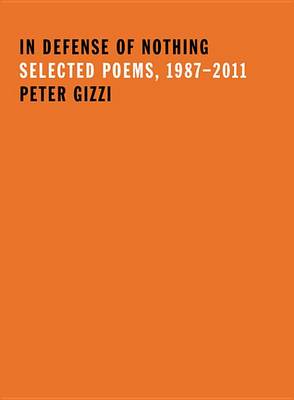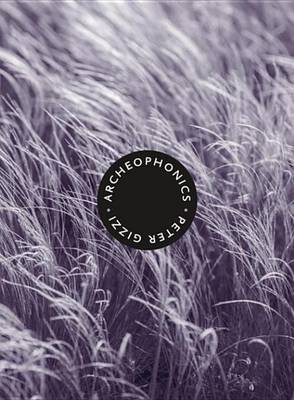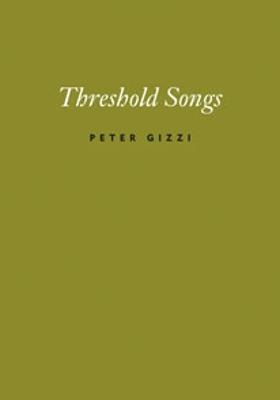Wesleyan Poetry
5 total works
Since his celebrated first book of poetry, Peter Gizzi has been hailed as one of the most significant and distinctive voices writing today. Gathered from over five collections, and representing close to twenty-five years of work, the poems in this generous selection strike a dynamic balance of honesty, emotion, intellectual depth and otherworldly resonance-in Gizzi's work, poetry itself becomes a primary ground of human experience. Haunted, vibrant, and saturated with luminous detail, Gizzi's poetry enlists the American vernacular in a magical and complex music. In Defense of Nothing is an immensely valuable introduction to the work of this extraordinary and singular poet. Check for the online reader's companion at indefenseofnothing.site.weleyan.edu.
Archeophonics is the first collection of new work from the poet Peter Gizzi in five years. Archeophonics, defined as the archeology of lost sound, is one way of understanding the role and the task of poetry: to recover the buried sounds and shapes of languages in the tradition of the art, and the multitude of private connections that lie undisclosed in one's emotional memory. The book takes seriously the opening epigraph by the late great James Schuyler: "poetry, like music, is not just song." It recognizes that the poem is not a decorative art object but a means of organizing the world, in the words of anthropologist Clifford Geertz, "into transient examples of shaped behavior." Archeophonics is a series of discrete poems that are linked by repeated phrases and words, and its themes and nothing less than joy, outrage, loss, transhistorical thought, and day-to-day life. It is a private book of public and civic concerns. An online reading companion is available at petergizzi.site.wesleyan.edu.
SOME JOY FOR MORNING
Now the connection with spring
has dissolved. Now that hysteria
is blooming.
Says every day I want to fly my kite.
Says what's a grammar when you is no longer you.
My world is hydrogen burning in space and in
the fullness of etc. I have read the news and
learned nothing.
I try to understand the
whooshing overhead. But for a
little light now.
I didn't realize the tree
was weeping. How was I to
know I am not alone. Wild
light.
The poems in this brilliant follow-up to the National Book Award finalist Archeophonics, are concerned with grieving, with poetry and death, with beauty and sadness, with light. As Ben Lerner has written, "Gizzi's poetry is an example of how a poet's total tonal attention can disclose new orders of sensation and meaning. His beautiful lines are full of deft archival allusion." With litany, elegy, and prose, Gizzi continues his pursuit toward a lyric of reality. Saturated with luminous detail, these original poems possess, even in their sorrowing moments, a dizzying freedom.
Now the connection with spring
has dissolved. Now that hysteria
is blooming.
Says every day I want to fly my kite.
Says what's a grammar when you is no longer you.
My world is hydrogen burning in space and in
the fullness of etc. I have read the news and
learned nothing.
I try to understand the
whooshing overhead. But for a
little light now.
I didn't realize the tree
was weeping. How was I to
know I am not alone. Wild
light.
The poems in this brilliant follow-up to the National Book Award finalist Archeophonics, are concerned with grieving, with poetry and death, with beauty and sadness, with light. As Ben Lerner has written, "Gizzi's poetry is an example of how a poet's total tonal attention can disclose new orders of sensation and meaning. His beautiful lines are full of deft archival allusion." With litany, elegy, and prose, Gizzi continues his pursuit toward a lyric of reality. Saturated with luminous detail, these original poems possess, even in their sorrowing moments, a dizzying freedom.
About Threshold Songs, the voices in these poems perform at the interior thresholds encountered each day, where we negotiate the unfathomable proximities of knowing and not knowing, the gulf of seeing and feeling, the uncanny relation of grief to joy, and the borderless nature of selfhood and tradition. Both conceptual and haunted, these poems explore the asymmetry of the body's chemistry and its effects on expression and form. The poems in Threshold Songs tune us to the microtonal music of speaking and being spoken. Check for the online reader's companion at http://thresholdsongs.site.wesleyan.edu.
Peter Gizzi's powerful new collection reminds us that the elegy is lament but also - as it has been for centuries - a work of love
In Peter Gizzi's powerful new collection, we find, in the poet's words, that "the elegy is a mode that can transform a broken heart in a fierce world into a fierce heart in a broken world." For Gizzi, ferocity can be reimagined as vulnerability, bravery and discovery, a braiding of emotional and otherworldly depth, "a holding open." In Gizzi's voice joy and sorrow make a complex ecosystem. One of our foremost practitioners of the lyric, Gizzi here extends his mastery of the form. In their quest for a lyric reality, these poems remind us that elegy is lament but also - as it has been for centuries - a mode of love poetry as well. "This new poetry," Kamau Brathwaite has written about Gizzi, "taking such care of temperature - the time & details of the world - meaning the space(s) in which we live - defining love in this way. Writing along the edge. A way of writing about hope."
[sample poem]
Creely Song
all that is lovely
in words, even
if gone to pieces
all that is lovely
gone, all of it
for love and
autobiography
as if I were
writing this
hello, listen
the plan is
the body and
all of it for love
now in pieces
all that is lovely
echoes still
in life & death
still memory
gardens open
onto windows
lovely, the charm
that mirrors
all that was, all
that is, lovely
in a song
In Peter Gizzi's powerful new collection, we find, in the poet's words, that "the elegy is a mode that can transform a broken heart in a fierce world into a fierce heart in a broken world." For Gizzi, ferocity can be reimagined as vulnerability, bravery and discovery, a braiding of emotional and otherworldly depth, "a holding open." In Gizzi's voice joy and sorrow make a complex ecosystem. One of our foremost practitioners of the lyric, Gizzi here extends his mastery of the form. In their quest for a lyric reality, these poems remind us that elegy is lament but also - as it has been for centuries - a mode of love poetry as well. "This new poetry," Kamau Brathwaite has written about Gizzi, "taking such care of temperature - the time & details of the world - meaning the space(s) in which we live - defining love in this way. Writing along the edge. A way of writing about hope."
[sample poem]
Creely Song
all that is lovely
in words, even
if gone to pieces
all that is lovely
gone, all of it
for love and
autobiography
as if I were
writing this
hello, listen
the plan is
the body and
all of it for love
now in pieces
all that is lovely
echoes still
in life & death
still memory
gardens open
onto windows
lovely, the charm
that mirrors
all that was, all
that is, lovely
in a song




